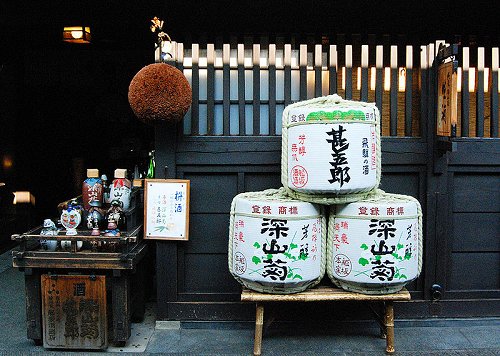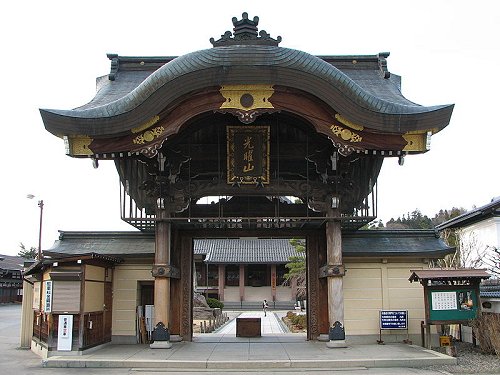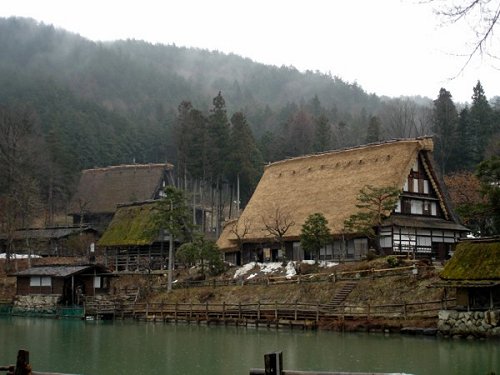Takayama (Japanese: 高山市), or in full Hida-Takayama, is a city in Gifu Prefecture, in Central Honshu, Japan. The city has a population approaching 100,000. While it traces its beginnings back to the Jomon period, present-day Takayama was founded in 1936. Since medieval times, it has been a renowned source for good timber. The people of Takayama excelled in carpentry and were employed in the construction of the Kyoto Imperial Palace as well as some of the finest temples in Kyoto and Nara.
On 1 February, 2005, Takayama underwent a massive expansion, absorbing nine surrounding towns and villages from Ono District and Yoshiki District. The newly expanded Takayama covers an area of 2,177 sq km. It is the largest city in Japan in terms of area.
The name Takayama means "tall mountain". It is a common place name, for there are at least two other towns in Japan by that name (one in Gunma Prefecture and another in Nagano Prefecture). To differentiate it from the other two, it is often called Hida-Takayama.
Today visitors come to Takayama to experience its quaint Edo-period streets lined with dainty shops and eateries. The city is famous for two annual Takayama festivals, Sanno Matsuri on 14-15 April and Yahata Matsuri on 9-10 October. Both involve the parade nof floats and portable shrines through the main streets of the city.
 Sake shop in Takayama
Sake shop in TakayamaSource: http://commons.wikimedia.org/wiki/File:Sake_shop_-Takayama.jpg
Author: Kat Clay

Author: Kat Clay

 Gate of Betsuin Temple, Takayama
Gate of Betsuin Temple, TakayamaSource: http://commons.wikimedia.org/wiki/File:Takayama_Betsuin_Jihokan.jpg
Author: Bernard Gagnon

Author: Bernard Gagnon

 Takayama, Japan
Takayama, JapanSource: http://commons.wikimedia.org/wiki/File:Fiume_Nakagawa.JPG
Author: Eejyanaika

Author: Eejyanaika

Planning your trip to Takayama
The Takayama railway station is on the JR Takayama Line. From Tokyo, take the Tokaido Shinkansen bullet train to Nagoya. Then transfer to the Wide View Hida Limited Express train that runs to Takayama. If you hold the Japan Rail Pass, you can take the Hikari train which takes 4 1/2 hours. Otherwise you can also take the Nozomi train for ¥14,800.An alternative to trains is to take the bus. You can catch one at the Shinjuku Bus Terminal to Takayama. It takes 5 1/2 hours and costs ¥6500.
Planning your travel within Takayama
Once you got to Takayama, it is easy to explore it on foot. Some youth hotels also rent out bicycles for ¥600 a day. Hida Folk Village in Takayama
Hida Folk Village in TakayamaSource: http://commons.wikimedia.org/wiki/File:Hida_Folk_Village.jpg
Author: Ryan Cragun

Author: Ryan Cragun

Places of Interest in Takayama
- Festival Float Hall
Museum exhibiting some of the floats used in the two annual Takayama festivals. - Hida Archaeology Museum
Museum displaying local artifacts and crafts. - Hida Folk Village
Site showcasing some 30 traditional houses relocated here from the surrounding places. - Kusakabe Heritage House
Well-preserved house of a Japanese moneylender includes display of folk-craft items and a small garden. - Kyoda Gallery of Traditional Toys
A limited but fascinating collection of toys. - Lion Mask Museum
Museum exhibiting some 800 masks used in the Japanese lion dance, performed to drive away wild beasts and evil spirits. - Miya River
River flowing through Takayama, lined with old houses in the Sannomachi Quarter. - Sannomachi Quarter
A well-preserved enclave with shops and houses from the Edo-period. - Yoshijima Heritage House
Well-preserved house of a sake merchant providing a glimpse into the interior deco of feudal Japan.
 Latest updates on Penang Travel Tips
Latest updates on Penang Travel Tips
 Map of Roads in Penang
Map of Roads in Penang
Looking for information on Penang? Use this Map of Roads in Penang to zoom in on information about Penang, brought to you road by road.
Copyright © 2003-2025 Timothy Tye. All Rights Reserved.

 Go Back
Go Back